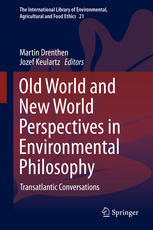

Most ebook files are in PDF format, so you can easily read them using various software such as Foxit Reader or directly on the Google Chrome browser.
Some ebook files are released by publishers in other formats such as .awz, .mobi, .epub, .fb2, etc. You may need to install specific software to read these formats on mobile/PC, such as Calibre.
Please read the tutorial at this link: https://ebookbell.com/faq
We offer FREE conversion to the popular formats you request; however, this may take some time. Therefore, right after payment, please email us, and we will try to provide the service as quickly as possible.
For some exceptional file formats or broken links (if any), please refrain from opening any disputes. Instead, email us first, and we will try to assist within a maximum of 6 hours.
EbookBell Team

4.4
72 reviewsThis is the first collection of essays in which European and American philosophers explicitly think out their respective contributions and identities as environmental thinkers in the analytic and continental traditions. The American/European, as well as Analytic/Continental collaboration here bears fruit helpful for further theorizing and research. The essays group around three well-defined areas of questioning all focusing on the amelioration/management of environmentally, historically and traditionally diminished landscapes. The first part deals with differences between New World and the Old World perspectives on nature and landscape restoration in general, the second focuses on the meaning of ecological restoration of cultural landscapes, and the third on the meaning of the wolf and of wildness. It does so in a way that the strengths of each philosophical school—continental and analytic—comes to the fore in order to supplement the other’s approach. This text is open to educated readers across all disciplines, particularly those interested in restoration/adaptation ecology, the cultural construction of place and landscape, the ongoing conversation about wilderness, the challenges posed to global environmental change. The text may also be a gold mine for doctoral students looking for dissertation projects in environmental philosophy that are inclusive of continental and analytic traditions. This text is rich in innovative approaches to the questions they raise that are reasonably well thought out. The fact that the essays in each section really do resonate with one another directly is also intellectually exciting and very helpful in working out the full dimensions of each question raised in the volume.